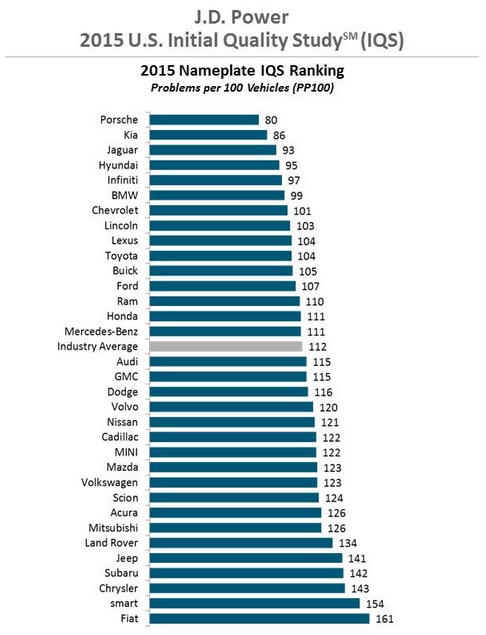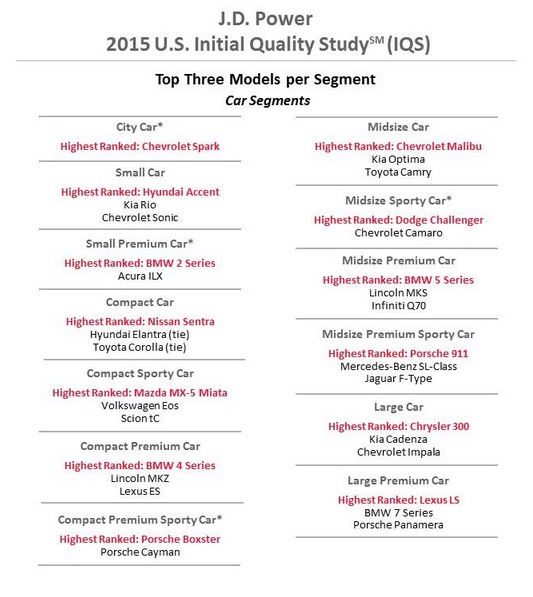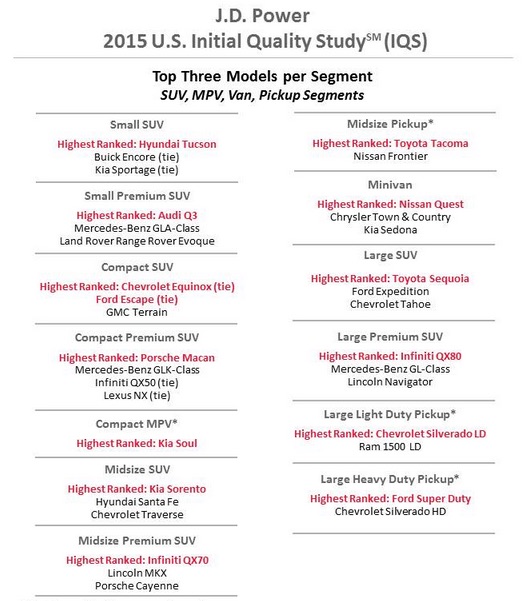With a significant year-over-year improvement, Korean brands continue to widen the quality gap with other automakers, while Japanese makes collectively fall below industry average for the first time in 29 years, according to the J.D. Power 2015 U.S. Initial Quality StudySM (IQS) released today.
The study examines problems experienced by vehicle owners during the first 90 days of ownership. Initial quality is determined by the number of problems experienced per 100 vehicles (PP100), with a lower score reflecting higher quality.
The industry experiences a 3 percent year-over-year improvement in initial quality, averaging 112 PP100 compared with 116 PP100 in 2014.
Historic Shifts in Performance by Brand Origin
Korean brands lead the industry in initial quality by the widest margin ever, averaging 90 PP100, which is an 11 PP100 improvement from 2014. For the first time in the study, European brands (113 PP100) surpass Japanese brands (114 PP100), while domestic makes (114 PP100) equal the Japanese for only a second time.

Although Japanese brands overall experience a 2 PP100 improvement from 2014, this has proven insufficient to keep pace with the industry, causing Japanese makes overall to fall below industry average for the first time in the 29-year history of the U.S. Initial Quality Study. Only four of the 10 Japanese brands included in the study post an improvement.
“This is a clear shift in the quality landscape,” said Renee Stephens, vice president of U.S. automotive quality at J.D. Power. “For so long, Japanese brands have been viewed by many as the gold standard in vehicle quality. While the Japanese automakers continue to make improvements, we’re seeing other brands, most notably Korean makes, really accelerating the rate of improvement. Leading companies are not only stepping up the pace of improvements on existing models, but are also working up front to launch vehicles with higher quality and more intuitive designs.”
Technology Continues to be a Trouble Spot for the Industry
Entertainment and connectivity systems remain the most problem-prone area for a third consecutive year, with voice recognition and Bluetooth pairing continuing to top the problem list.
The majority of models included in the study that have voice recognition systems experience 10 or more PP100 related to this feature.

The number of owners who indicate having voice recognition in their new vehicle has increased to 67 percent in 2015 from 57 percent in 2013. Based on results from the J.D. Power 2015 U.S. Tech Choice Study,SM this will continue to increase as simple wireless device and near field communication are the top two entertainment/connectivity technologies consumers indicate wanting on their next vehicle.
“Smartphones have set high consumer expectations of how well technology should work, and automakers are struggling to match that success in their new vehicles,” said Stephens. “However, we are seeing some OEMs make important improvements along the way. What’s clear is that they can’t afford to wait for the next generation of models to launch before making important updates to these systems.”
Highest-Ranked Nameplates and Models
Porsche ranks highest in initial quality for a third consecutive year, posting a score of 80 PP100. With a 20 PP100 improvement from 2014, Kia follows Porsche in the rankings at 86 PP100. This marks the first time in the history of the study that Kia has led all non-premium makes in initial quality.

Jaguar (93 PP100), Hyundai (95 PP100) and Infiniti (97 PP100) round out the top five nameplates. Infiniti is one of the most improved brands in the study, lowering its problem score by 31 PP100 from 2014.
Model awards are spread among several corporations, with many receiving multiple awards.
General Motors (4): Chevrolet Equinox (tie); Chevrolet Malibu; Chevrolet Silverado LD; and Chevrolet Spark
Hyundai Motor Company (4): Hyundai Accent; Hyundai Tucson; Kia Sorento; and Kia Soul
Nissan Motor Company (4): Infiniti QX70; Infiniti QX80; Nissan Sentra; and Nissan Quest
Volkswagen AG (4): Audi Q3; Porsche 911; Porsche Boxster; and Porsche Macan
BMW (3): BMW 2 Series; BMW 4 Series; and BMW 5 Series
Toyota Motor Corporation (3): Lexus LS; Toyota Tacoma; and Toyota Sequoia
Fiat Chrysler Automobiles (2): Chrysler 300 and Dodge Challenger
Ford Motor Company (2): Ford Escape (tie) and Ford Super Duty
Mazda (1): Mazda MX-5 Miata
Plant Assembly Line Quality Awards
BMW AG’s Rosslyn, South Africa plant, which produces the BMW 3 Series, receives the Platinum Plant Quality Award for producing models with the fewest defects or malfunctions. Plant quality awards are based solely on defects and malfunctions and exclude design-related problems.
In the North America/South America region, Toyota Motor Corporation’s Cambridge North, Ontario, Canada (TMMC) plant, which produces the Toyota Corolla, receives the Gold Plant Quality Award.
Kia Motors Corporation’s Kwangju Plant 1, Korea, which produces the Kia Soul, receives the Gold Plant Quality Award in the Asia Pacific region.
The 2015 U.S. Initial Quality Study is based on responses from more than 84,000 purchasers and lessees of new 2015 model-year vehicles surveyed after 90 days of ownership. The study, now in its 29th year, is based on a 233-question battery organized into eight problem categories designed to provide manufacturers with information to facilitate the identification of problems and drive product improvement. The study was fielded between February and May 2015.
- See more at: http://www.jdpower.com/press-releases/2015-us-initial-quality-study-iqs#sthash.HNnu3KtF.dpuf